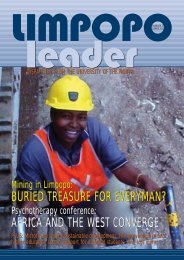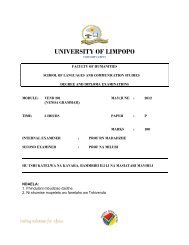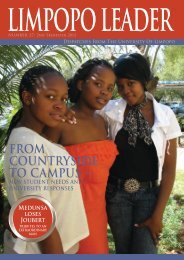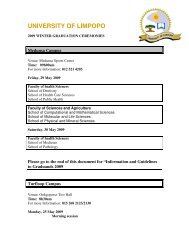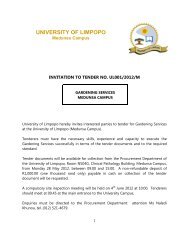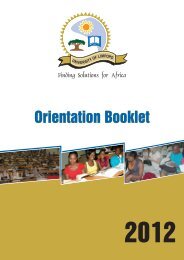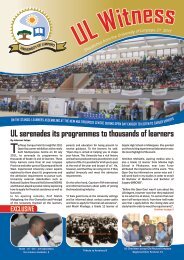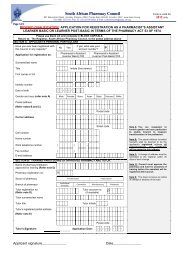Limpopo Leader - University of Limpopo
Limpopo Leader - University of Limpopo
Limpopo Leader - University of Limpopo
You also want an ePaper? Increase the reach of your titles
YUMPU automatically turns print PDFs into web optimized ePapers that Google loves.
World Economic CrisisTHE SOCIAL IMPACTB Y S E L L O S I T H O L E 2tTHE CURRENT ECONOMICCLIMATE HAS STRIKINGPARALLELS WITH THEECONOMIC DEPRESSION OFTHE 1930S, WHICH WAS ALSOFELT FIRST IN THE UNITEDSTATES AND THEN SPREADTHROUGHOUT THE WORLD.Look at some facts about thecurrent economic climate in SouthAfrica:• ‘40 000 mine workers will losetheir jobs’ (mutiply this figureby 10 because each workerfeeds almost ten people)(Hill 2008:43)• Donor funding for NGOs thatprovide welfare services aredrying up• People are losing their housesand cars• Many small businesses aregoing belly up• The burden on the country’swelfare system will be heavy.(The xenophobic attacks <strong>of</strong> lastyear are just one indicator <strong>of</strong>a shrinking welfare pie.)It is true that every cloud has asilver lining – even if the lattermay not be visible to the nakedeye. The economic depression <strong>of</strong>the 1930s in the United Stateshad apocalyptic ramifications forbusiness and welfare. The impacton business was negative; on thewelfare front, however, thingswere much worse. However, anumber <strong>of</strong> positive and significantmilestones were also recorded.The combined failures <strong>of</strong> theeconomic system, privatecharitable agencies and state andlocal governments, placed socialwelfare much more firmly on thefederal agenda. In addition, the1930 Great Depression in theUnited States paved the way forthe election <strong>of</strong> Franklin Rooseveltto the presidency. Roosevelt, likePresident Barack Obama, had agenuine concern for others.Roosevelt had a personalexperience <strong>of</strong> polio, andObama’s parents, and Obamahimself to some extent,experienced ‘jim crow’. 3 Afterascending to power, Rooseveltintroduced policies referred to asthe New Deal, which weredesigned to reverse the economicwoes <strong>of</strong> the nation.The 1930 Depression in SouthAfrica had similar results. Theresponse <strong>of</strong> the then governmentwas to institute the CarnegieCommission to look into the PoorWhite Problem. Members <strong>of</strong> thecommission travelled throughoutthe country investigating theimpact <strong>of</strong> the ravages <strong>of</strong> thedepression on poor whitefamilies. After collecting data,the commission made thefollowing recommendations:• The establishment <strong>of</strong> a statebureau which would beresponsible for people’s socialwelfare (for whites only).• The training <strong>of</strong> skilled,university-educated socialworkers well versed in thesocial sciences.Consequently, the first statewelfare department was institutedin 1937, a development thatmarked the beginning <strong>of</strong>organised state intervention insocial welfare, the rapiddevelopment <strong>of</strong> courses for socialwork training in South Africanuniversities, and the pr<strong>of</strong>essionalisation<strong>of</strong> social work.It is inevitable that the currenteconomic recession will meanhardship in South Africa:unemployment will rise, andfamilies will face shortages <strong>of</strong>food, loss <strong>of</strong> shelter, and transportdifficulties. Families and marriagesbreak down during periods<strong>of</strong> scarcity. People who wereliving above the poverty linesuddenly have to strip themselves<strong>of</strong> their dignity, swallow theirpride, and queue for days on endfor unemployment insurancebenefit funds. Worse still, manywill be reduced to begging for2 Pr<strong>of</strong>essor Sithole is caretaker director <strong>of</strong> the School <strong>of</strong> Social Sciences on the Turfloop campus <strong>of</strong> the <strong>University</strong> <strong>of</strong> <strong>Limpopo</strong>.3 A euphemism for American-style racial segregation.P A G E 1 4



